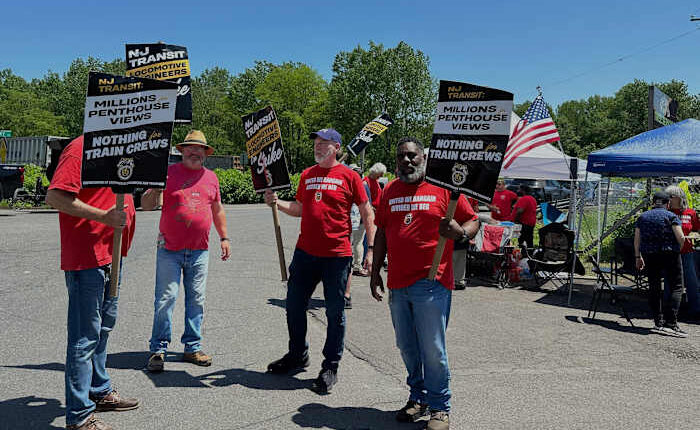
In Newark, New Jersey, the train engineers of New Jersey Transit have reached a preliminary agreement to put an end to their strike that lasted three days. This strike impacted around 100,000 daily commuters, including those traveling to Newark airport and New York City across the Hudson River. The union stated that its members will resume work on Tuesday, and train services will return to their normal schedules.
This strike, which began on Friday, marked New Jersey’s first transit strike in over four decades. It forced regular New Jersey Transit passengers to seek alternative modes of transportation like buses, cars, taxis, and boats, or even consider staying home. The primary issue revolved around finding a way to provide a wage increase for the engineers without putting the financial stability of the transit agency at risk.
Initially, the Brotherhood of Locomotive Engineers and Trainmen announced that normal train operations would resume on Monday. However, shortly after this announcement, a union spokesperson, Jamie Horwitz, revealed that NJ Transit had informed them that service would restart on Tuesday at 12:01 a.m. instead.
A transit agency statement said the Tuesday start was necessary because “it takes approximately 24 hours to inspect and prepare the infrastructure before returning to full scheduled service.”
A union statement sent by email said the terms of the agreement would be sent to the union’s 450 members who work as locomotive engineers or trainees at the passenger railroad.
“While I won’t get into the exact details of the deal reached, I will say that the only real issue was wages and we were able to reach an agreement that boosts hourly pay beyond the proposal rejected by our members last month and beyond where we were when NJ Transit’s managers walked away from the table Thursday evening,” said Tom Haas, the union’s general chairman at NJ Transit.
He added that the union was able to show management “ways to boost engineers’ wages … without causing any significant budget issue or requiring a fare increase.”
The union statement also said the deal would be submitted for a ratification vote by the national union and would require a vote of the New Jersey Transit board at its next regularly scheduled meeting on June 11. NJ Transit’s board also has to approve the deal.
“To offer the understatement of the year, this is a very good outcome,” New Jersey Governor Phil Murphy said at a Sunday evening news conference. He commended the two sides for finding an agreement that is “both fair to NJ Transit’s employees while also being affordable for our state’s commuters and taxpayers.”
NJ Transit CEO Kris Kolluri didn’t provide details of the deal, but said it was “fair and fiscally responsible.” He thanked the union for negotiating in good faith.
“The deal itself reflects a series of concessions that came together by way of a work bill that will eventually end up paying for this fair wage that the union has asked for,” Kolluri said at the news conference.
Buses would be provided on Monday, but Murphy and Kolluri both urged commuters, if possible, to work from home for one more day.
“Please do that tomorrow so we can move essential employees through the system,” Kolluri said.
A month earlier, members of the union had overwhelmingly rejected a labor agreement with management.
NJ Transit — the nation’s third-largest transit system — operates buses and rail in the state, providing nearly 1 million weekday trips, including into New York City. The walkout halted all NJ Transit commuter trains, which provide heavily used public transit routes between New York City’s Penn Station on one side of the Hudson River and communities in northern New Jersey on the other, as well as the Newark airport, which has grappled with unrelated delays of its own recently.
Mark Wallace, the union’s national president, had said NJ Transit needs to pay engineers a wage that’s comparable to Amtrak and Long Island Railroad because some are leaving for jobs on those other railroads for better pay.
The union had said its members have been earning an average salary of $113,000 a year and it wanted to see an agreement for an average salary of $170,000.
NJ Transit leadership, though, disputed the union’s data, saying the engineers have average total earnings of $135,000 annually, with the highest earners exceeding $200,000.
___
Weber reported from Los Angeles. Associated Press writer Josh Funk contributed from Omaha, Nebraska.
Copyright 2025 The Associated Press. All rights reserved. This material may not be published, broadcast, rewritten or redistributed without permission.

















